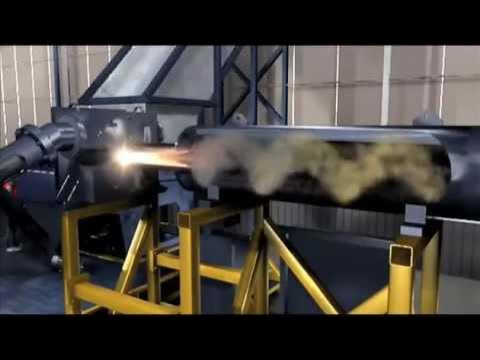PPLI - Company Profile
Summary
TLDRPPLI is an Indonesian company focused on comprehensive waste management solutions, offering services for both hazardous and non-hazardous waste. Established in 1994, it operates the country's first licensed waste management facility. With advanced treatment processes, including stabilization, waste-to-fuel conversion, and liquid waste treatment, PPLI ensures environmentally responsible waste disposal. It operates state-of-the-art eco landfills, meets global standards, and develops innovative technologies, such as methane-to-electricity conversion. Dedicated to sustainability, PPLI also supports local communities and provides solutions for complex waste streams in industries like oil, gas, and geothermal.
Takeaways
- 😀 PPLI is an Indonesian company founded in 1994, specializing in the collection, recycling, treatment, and disposal of hazardous and non-hazardous waste.
- 😀 The company is 95% owned by Doa and 5% by the Indonesian government.
- 😀 PPLI was the first and only licensed waste management facility in Indonesia until 2000, and has since undergone significant upgrades and expansions.
- 😀 In 2007, the company made substantial capital investments to improve its facilities and services across Indonesia.
- 😀 PPLI was acquired by Doa Ecosystem Co. Limited in 2009, shifting the focus toward integrated environmental management and sustainability.
- 😀 The company’s waste management procedure involves laboratory testing and integrated tracking systems (OLIMS) to ensure safe handling and disposal of waste.
- 😀 PPLI uses innovative methods such as waste blending to produce alternative fuels, contributing to energy recovery and sustainability.
- 😀 The company operates modern eco landfills engineered to meet international standards, including U.S. EPA, EU, and World Bank criteria.
- 😀 PPLI is developing a methane gas conversion system in its landfills to generate electricity for its operations, reducing environmental impact.
- 😀 The company offers specialized services for difficult waste streams, including lithium batteries, mercury lamps, and PCB transformers.
- 😀 PPLI's drilling waste management services cater to the oil, gas, and geothermal sectors, providing efficient treatment for offshore and onshore drilling operations.
Q & A
What is PPLI and what services does it provide?
-PPLI is an Indonesian company specializing in waste management. It offers collection, recycling, treatment, and disposal services for both hazardous and non-hazardous waste, with a focus on environmental sustainability.
How did PPLI evolve after its establishment in 1994?
-PPLI was established in 1994 as the first licensed waste management facility in Indonesia. After being acquired by Maeh Group in 2000, the company underwent significant upgrades to improve its facilities and expand its capacity until 2006.
What are some of PPLI's key environmental management achievements?
-PPLI has achieved several certifications, including ISO 14001, ISO 9001, and ISO/IEC 17025. The company also gained laboratory accreditation from the Ministry of Environment and operates with environmentally responsible practices.
What is the role of the laboratory at PPLI?
-PPLI's laboratory plays a crucial role in waste management by analyzing samples before accepting waste to determine the appropriate handling and treatment methods. This ensures that waste is treated safely and in compliance with regulations.
How does PPLI ensure secure waste transportation?
-PPLI uses advanced tracking systems such as CCTV, GPS, and manifest documentation to monitor incoming and outgoing vehicles. Waste is also labeled with barcodes for secure and smooth transportation.
What is the stabilization treatment process for waste at PPLI?
-The stabilization process at PPLI involves chemically pre-treating solid waste with Portland cement, fly ash, absorbent clay, and water. The treated waste is then safely deposited in an eco landfill.
How does PPLI handle liquid waste treatment?
-PPLI employs various treatment processes for liquid waste, including chemical precipitation, coagulation, flocculation, and biological treatment. Treated liquid waste passes through engineered wetlands before final testing and discharge.
What is fuel blending and how does PPLI use it?
-Fuel blending is a process where liquid and solid waste with high calorific value are carefully mixed to create alternative fuel. This fuel is then delivered to third-party users, contributing to energy recovery and sustainability.
What is the eco landfill at PPLI, and how does it meet international standards?
-PPLI's eco landfill is designed to meet Indonesian, World Bank, U.S. EPA, and EU standards. It includes a Class I eco landfill in operation since 1994, and a Class II eco landfill developed in 2007, with plans to convert methane gas into electricity.
What unique waste streams does PPLI treat?
-PPLI has developed special treatments for difficult waste streams, including lithium batteries, mercury lamps, PCB transformers, accumulator batteries, and ozone-depleting substances, ensuring safe disposal and recycling of hazardous materials.
Outlines

This section is available to paid users only. Please upgrade to access this part.
Upgrade NowMindmap

This section is available to paid users only. Please upgrade to access this part.
Upgrade NowKeywords

This section is available to paid users only. Please upgrade to access this part.
Upgrade NowHighlights

This section is available to paid users only. Please upgrade to access this part.
Upgrade NowTranscripts

This section is available to paid users only. Please upgrade to access this part.
Upgrade Now5.0 / 5 (0 votes)





